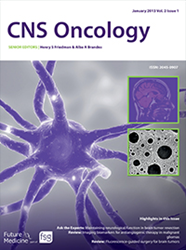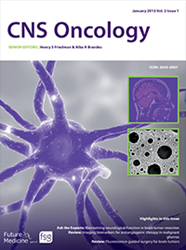Brain Tumor Patients Should be Screened for Depression


(PRWEB UK) 5 May 2015
Because depression in brain cancer patients is a common but often overlooked condition, oncologists should regularly screen tumor patients for depression, according to an article in the current issue of CNS Oncology. The journal is published by Future Medicine, an imprint of Future Science Group.
The authors also propose that more studies be completed to explore the efficacy of anti-depression treatments, as well as the value of depression biomarkers for future brain tumor research.
“Psychological distress is an important complication in patients with brain tumors, but often remains undiagnosed and untreated,” said Adomas Bunevicius MD, PhD, lead author of the article. “Methodologically rigorous studies aiming to identify the most optimal depression screening tools for patients with brain tumor are lacking. As a consequence, to date there are no evidence based depression diagnostic algorithms.”
The authors propose that implementation of reliable depression screening algorithms in routine neuro-oncology setting could improve recognition of depression, and ultimately, improve patient outcomes. The article reviews available screening tools and recommends the use of The Hospital Anxiety and Depression Scale – Depression subscale and Patient Health Questionnaire. The authors recommend that patients who screen positive for depression be referred for detailed psychiatric assessment prior to initiating anti-depressive treatment, and that further methodologically rigorous studies investigating psychometric properties of depression scales are urgently needed. Studies evaluating the efficacy of anti-depressive treatments and the clinical value of depression biomarkers are also important avenues for future research endeavors in brain tumor patients.
“We believe that studies aiming to improve identification and management of psychological distress should be considered a priority in the field of neuro-oncology,” said Bunevicius. “Such knowledge could significantly improve quality of life and clinical outcomes for patients suffering from these devastating disorders.”
The reasons cited for a deeper focus on depression in brain tumor patients are two-fold. First of all, patient-centered outcomes, including symptoms of psychological distress, are increasingly being used as secondary outcome measured in clinical trials. Therefore, accurately identifying brain tumor patients suffering from psychological distress is becoming increasingly important in both clinical practice and in research studies.
In addition, and perhaps more important to the individual patients, depression carries serious health risks for those with brain tumors. Studies have associated greater depressive symptom severity with shorter overall survival of brain tumor patients, and depressive symptoms have been linked to numerous health-related aspects of quality of life. Furthermore, depression predicts cognitive impairment and puts survivors at increased risk for suicide ideation. Therefore depression should be actively sought and managed in patients with established diagnosis of a brain tumor.
“This article provides helpful practice points for the implementation of reliable depression screening in a neuro-oncology setting, and explores the efficacy of anti-depression treatments, as well as the value of depression biomarkers for future research,” said Roshaine Gunawardana, Managing Commissioning Editor.
Click here to read the complete article in CNS Oncology. Additional articles and content on cancer can be found on Oncology Central, Future Science Group’s free eCommunity for oncology professionals. The membership-based portal offers free access to breaking oncology news and peer-reviewed journal articles, with content selected by fellow clinicians.
Article: Bunevicius A, Pranckeviciene, A. Depression screening in patients with brain tumors: a review. CNS Oncology. (04(02) and 71–78) (2015)
About Future Science Group
Founded in 2001, Future Science Group (FSG) is a progressive publisher focused on breakthrough medical, biotechnological, and scientific research. FSG’s portfolio includes two imprints, Future Science and Future Medicine. Both publish eBooks and journals. In addition to this core publishing business FSG develops specialist eCommunities. Key titles and sites includes Bioanalysis Zone, Epigenomics, Nanomedicine and the award-winning Regenerative Medicine.
The aim of FSG is to service the advancement of clinical practice and drug research by enhancing the efficiency of communications among clinicians, researchers and decision-makers, and by providing innovative solutions to their information needs. This is achieved through a customer-centric approach, use of new technologies, products that deliver value-for-money and uncompromisingly high standards. http://www.futuresciencegroup.com